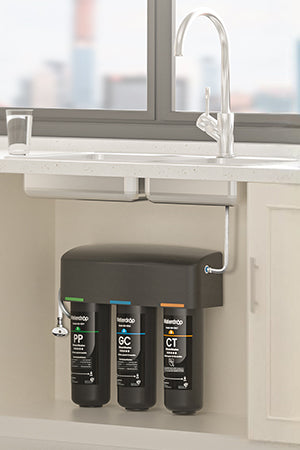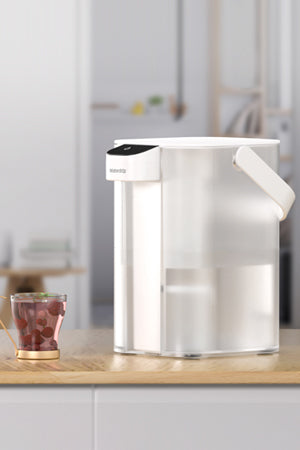Fluoride is a naturally occurring mineral present in most of the world's waters, including Singapore waters. Fluoride is commonly added into drinking waters for the prevention of tooth decay.
Nevertheless, not all are at ease with the consumption of fluoride on a daily basis. Most Singaporeans question: Does boiling eradicate fluoride? In this blog, the facts shall be laid bare, the associated questions answered and the safe means of minimizing fluoride content in your potable water revealed.
What is Fluoride and Why is it Added to Our Water?
Fluoride is a naturally occurring mineral that can be found within the soil, rocks, and waters. Fluoride has been introduced into the public tap water of Singapore since the year 1958 under
a national program for the prevention of dental cavities . Fluoride in tap water is maintained at a safe level by the Singapore Ministry of Health for oral health support.
Though fluoride carries known dental benefits, there are lifelong concerns for some people. Excess fluoride can cause
dental fluorosis (white spots on the teeth) or skeletal fluorosis (bone issues) exceedingly rarely. As a result, many families question whether filtering or boiling can eliminate fluoride from their tap water.
Does Boiling Water Eliminate Fluoride?
The short answer is no. Boiling does not remove fluoride from water.
When you boil the water, the viruses and bacteria die and the water is microbiologically safer. But boiling will remove only
the volatile compounds (such as chlorine), which will evaporate off into the atmosphere. The minerals, such as fluoride, don't evaporate and are stable. In fact, when the water evaporates upon boiling, the fluoride level can actually get slightly higher.
So if you are living in Singapore and believe boiling tap water will help cut fluoride, it won’t. You will require another method.
What Does Boiling Water Remove?
You'd like to know what boiling water can do?
- Kills germs – Boiled water at 100°C kills off bacteria, viruses, and parasites.
- Removes chlorine – Chlorine can evaporate when water is boiled.
- Does not remove heavy metals – Lead, mercury, and arsenic remain after boiling.
- Does not leach fluoride – Fluoride is immobile and heat stable.
This would work for an emergency situation (like a rumor of contamination), but not for fluoride or other chemical pollutant removal.
Why Can’t Fluoride Be Boiled Out?
Fluoride is a dissolved mineral, and minerals don't evaporate as the water comes to a boil. They are left behind. That is why boiling isn't an effective step for fluoride removal.
If you want to reduce fluoride in your daily drinking water, you will need a specific filtering system. A NSF certified reverse osmosis water filter is able to remove nearly all contaminants in your tap water.
How Do I Remove Fluoride from Singapore Tap Water?
Some of the known methods for cutting or reducing fluoride:
1. Reverse Osmosis (RO)
Reverse osmosis is among the most effective techniques for filtering fluoride from water. It pushes the water through a membrane that filters the dissolved solids like fluoride and removes up to 99.99%.
The Waterdrop RO Water Filter is a great alternative for Singapore households because it is an under-the-sink RO system. It is compact, energy-efficient, and produces pure-tasting water that is fluoride-free, heavy metals-free, and free of chlorine and other dangerous substances.
2. Activated Alumina
These filters use permeable aluminum oxide for fluoride filtration. They are not very convenient for everyday home use compared to RO systems and need frequent replacement.
3. Distillation Units
Distillers boil up water and collect the steam, leaving minerals like fluoride behind. Even though they work, distillers are slow and highly energy-intensive.
Is Fluoride Safe to Drink?
Fluoride is acceptable and healthful for the teeth in small quantities. Fluoride content of tap water is strictly controlled by
the government of Singapore and maintained within approved recommendations.
But if you want to reduce your consumption of fluoride—either for health reasons, personal choice, or because you already use fluoride-containing toothpaste—the easiest practical way is to put in a water filtration system.
Why Do Singaporeans Prefer Filtered Water?
Even though Singapore’s tap water is considered safe and high-quality, many residents still prefer filtered water for reasons such as:
- Better taste – Removing chlorine and fluoride makes water taste fresher.
- Extra protection – Filters can catch trace impurities left over from municipal treatment.
- Health regulation – Some people want greater regulation of chemicals and minerals in their tap water.
Recommended: Waterdrop Water Filters for Impurity Removal
If you want an effective way to screen fluoride from tap water within Singapore,
Waterdrop Reverse Osmosis Systems are highly recommended. Why?
- High Rate of Contaminants Removal – Waterdrop RO filters can remove up to 99% of impurities present in public water.
- Space-Efficient and Modern Style – Tankless design saves your undersink space.
- Smart Features – Some models feature TDS monitoring for real-time display of the purity of the water.
- Cost-Effective – Long-lasting filters and energy-efficient performance save money over time.
You will have the comfort knowing that your kitchen tap water is clean and fluoride-free and devoid of other contaminants you don't want.
Does Bottled Water in Singapore Have Fluoride?
Not necessarily. Some bottled waters are naturally fluoridated, depending on the source. You can't always read the labels because they don't always state fluoride content, and bottled waters aren't always fluoride-free.
In contrast, a home filtration system offers consistent quality and control.
Should Fluoride be Removed from Water in Singapore?
It is a preference for the individual. Fluoride levels are controlled by the government and are maintained within a safe spectrum. However, parents who have very young children, those who have kidney issues, or who want to avoid added fluoride will choose filtration.
If you currently use fluoride toothpaste, you can feel free to reduce your fluoride intake from your faucet water by switching filtered varieties.
Final Considerations: Boiling vs Filtering for Fluoride
Boiling kills off germs but doesn't remove fluoride. The most effective fluoride filtering method is reverse osmosis filtration.
Waterdrop water filters offer Singapore families an affordable, convenient, and trusted way of enjoying pure, fluoride-free drinking water at home. So, if you find yourself wondering, is boiling enough, the answer is no. But there are filters that can give you pure, fresh-tasting water day after day.




































































